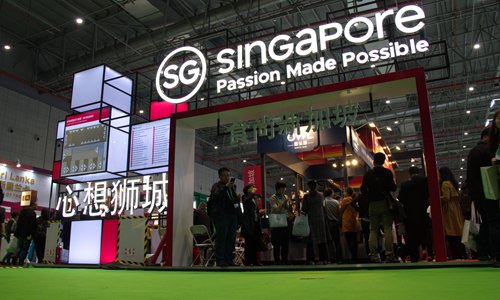HOME >> OPINION
Reasons aplenty for positivity in Singapore ties
By Zha Wen Source:Global Times Published: 2019/10/23 23:51:30

A view of a Singaporean company's booth at the first CIIE in Shanghai on November 10, 2018 Photo: IC
The protocol on upgrading China-Singapore Free Trade Agreement which entered force on October 16 is a key milestone in relations that have been through vicissitudes. Economic cooperation has been a bedrock of relations with the Southeast Asian city state. As early as 2015, the two countries agreed to start talks to upgrade the free trade agreement during Chinese President Xi Jinping’s visit to Singapore. In November 2018, Chinese Premier Li Keqiang and Singaporean Prime Minister Lee Hsien Loong witnessed the signing of the upgraded free trade agreement. The upgrade of the China-Singapore Free Trade Agreement has benefited from the frequent interactions between the top leaders of the two countries.
China and Singapore had built close economic ties long before the formal establishment of diplomatic relations. Singapore has always been an important market for China's exports and a hub of trade between China and Southeast Asian countries. After the establishment of diplomatic relations in 1990, trade between the two sides rose rapidly and became a cornerstone of ties. In 2008, China and Singapore signed a free trade agreement, which did away with tariffs on all Chinese exports and eliminated tariffs for 95 percent of the city state's exports to China. This is the first time China has signed such a comprehensive free trade agreement with an Asian country.
Singapore is also a beneficiary of an international free trade system. As a city state with severe shortage of natural resources and lack of an economic hinterland, Singapore even needs to import fresh water. Its prosperity and survival depend on free international investment and trade. The awareness to persevere and the resolve to emerge victorious amid such a challenge fundamentally determine the nature of pragmatism in Singapore's diplomacy.
The rise of protectionism in the West has also made Singapore anxious. According to a survey in 2018, Singaporean economists and analysts ranked trade protectionism as the biggest threat to its economy. US withdrawal from the Trans-Pacific Partnership Agreement (TPP) and the outbreak and escalation of the US-launched trade war against China stepped up Singapore's crisis awareness and affected its foreign policy. It can be said that an ascendant China and a protectionist US have once again pushed Singapore to a new crossroads of foreign policy.
It should be acknowledged that over the past few years, China-Singapore relations have gone through twists and turns. Singapore was once regarded as an active supporter of the US pivot to Asia as well as a promoter of the TPP, and played a certain role in the so-called South China Sea arbitration case, all of which led China-Singapore relations to a historical low in 2016.
Nevertheless, the indestructible historical, political and economic ties between the two countries to a large extent explain why the relations were quickly restored, and saw new developments in just a few months after going through an intense flux. Moreover, a rapidly changing international situation has led to the countries leveraging common interests for better ties. The implementation of the upgraded protocol of the China-Singapore Free Trade Agreement makes it clear to the world that the two sides will become firm defenders of the free trade system.
Flexibility and pragmatism have been consistent in Singapore's diplomacy. We should also try to understand what's behind the vacillation of some small and medium-sized countries in terms of foreign policy in a short period of time under specific conditions. When it comes to China-Singapore ties, it should be first realized that the Southeast Asian country known for a development paradigm is an independent, multi-ethnic sovereign state with its own national interests to defend. One cannot assume that Singapore is bound to stand with China on all international issues simply because the Chinese constitute the main ethnic group in Singapore. In addition, we should recognize the positive role of Singapore in China's economic development at different stages in history. Currently, Singapore is one of the most important partners of China under the Belt and Road Initiative.
To sum up, our confidence in relations with Singapore is based on common interests between the two countries. We should believe that Singapore, known for its pragmatism, will make the right choice at the crossroads of diplomatic strategy.
The author is an associate professor at the Institute of International Relations with the China Foreign Affairs University. opinion@globaltimes.com.cn
Posted in: ASIAN REVIEW